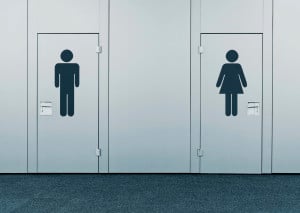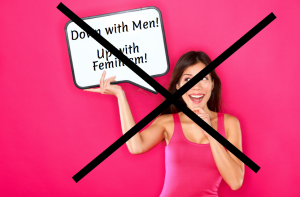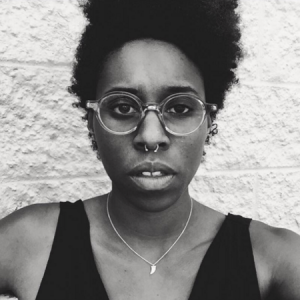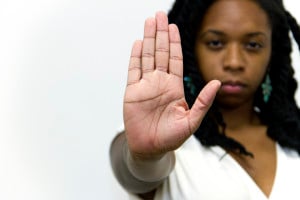
One person, in focus, is harassed by a group of other people behind them, out of focus.
(Content Warning: rape culture)
Fellas, as we begin 2017, I think it’s way past time we focused on delivering women and other people of marginalized genders (and ourselves, whether we’re cis or trans) a gift that will be appreciated more than anything else: a healthier masculinity.
I know some of you may think you’re already on that path. Since you’re reading this on a website dedicated to feminism and addressing a range of social issues, you may think of yourself as someone who is relatively “socially aware” and that you already have your bases covered.
Let’s pump those brakes.
If you had asked me what feminism was a few years ago, any response I offered would’ve been about as useful as a screen door on a submarine.
But, like a growing number of men (including many reading this), I soon became more acquainted with social justice spaces, literature, and vocal activists that helped me realize the many ways our culture prioritizes masculinity while marginalizing femininity.
Still, knowledge doesn’t automatically translate into a complete transformation of our beliefs, values, and behavior.
This isn’t the Matrix, where laypeople can be uploaded with data and moments later become experts. I sure wish this were the case, because hypermasculinity (also known as “toxic masculinity”) is a beast!
From boyhood to adulthood, Western patriarchal culture socializes men into a way of being that emphasizes strength, represses emotions (except anger, which we rationalize as acceptable), and encourages male sexual prowess while simultaneously holding femininity in contempt.
These harmful ideas become our religion, something we’re indoctrinated to accept, obey without question, and regard as valid – despite all the contrary evidence revealing its flaws.
Even when men acquire some level of understanding about what these patriarchal beliefs are, being able to call out a problem by name isn’t the same as abstaining from and proactively challenging the problem, in addition to learning more healthy ways to think and behave.
I get the urge to want to pat yourself on the back or to point to more blatant examples of sexism and bigotry and declare, “That’s not me – I’m different.”
Doing the work I do advocating for human rights and equality around the country side-by-side with self-avowed progressives and humanists who seemingly want to make the world a better place has been a sobering experience. I have met many seeking to be catalysts for change who accept the limitations of their perspective.
Unfortunately, I’m also too familiar with those who are convinced they are “safe,” all the while oblivious to the ways they harbor discriminatory attitudes.
Some of the nicest racists and most cordial sexists I’ve ever met have been folks from progressive spaces and “woke” communities.
We have to assume that there will always be room for improvement. I include myself in this approach. I may be more cognizant about toxic masculinity now than I was a few years ago or even a few months ago, but sexism is like a disgusting habit that infects men down to our marrow. Despite my best efforts, there remains instances where oppressive thoughts and opinions manifest.
It’s vital that men fight complacency.
Trust, just like some of the activists and well-intentioned individuals I’ve encountered, you likely still act in ways that comply with cultural prejudices in ways you don’t realize.
The more honest we are with ourselves, the better acquainted we become with our shortcomings. Below are three key issues men must work to confront on a daily basis and ditch in 2016.
1. Harassment
Living in a society that normalizes male entitlement leads to privileging our whims and gratification at the expense of trivializing the desires of women especially.
We are reared to be aggressive and assert dominance over others. This harmful social feedback loop convinces us, especially men attracted to women, that we deserve access to women’s time and their objectified bodies based solely on our impulses.
And guess what. You likely have or continue to think or act this way also. You just call it by another name.
Sliding into the inbox of a woman you hardly know (or don’t know at all) to talk dirty. Pestering a woman who has her headphones on and is avoiding eye contact.
Pressuring someone to just “give you a chance” despite their reluctance. Catcalling and assuming it’s an acceptable form of showing interest. Groping women you consider “irresistible,” reasoning with yourself that their clothing choice screams that they want your uninvited attention.
Not accepting no for an answer because you believe in the power of persistence, and that figuring out the right combination of words may change her mind…
It’s harassment. All of it.
The male ego indulges in a fantasy world our culture reinforces by grooming us to believe persistence turns a no into a yes, transforms the obscene into the palatable with “boys will be boys” slogans, and actually blames women and people perceived as women for the behavior of men. (That link is cisnormative, but both cis and trans men experience varying levels of male privilege.)
With the support of a male-centered social environment, we – whether we’re more socially enlightened or not – have a strong tendency to erase boundaries and graft our desires over the autonomy of women.
How else do you explain the irrational urges behind sending unsolicited dick pictures?
But no matter what we’ve been led to believe, this entire way of thinking is inexcusable.
Be honest with yourself.
If anything I’ve mentioned even remotely describes actions you partake in, find humorous, encourage in others, or sympathize with, now is the time to exercise mindfulness and process more respectful ways to approach women.
2. Misogynoir
I don’t care how clever or intelligent or woke you think you are – nobody can escape the influence of culture. It surrounds and engulfs us. It rains down on us constantly through media, customs, art, music, literature, and even religion.
Cultural messages that present men as whole human beings – while regarding women and other people or marginalized genders as sexual objects and animals (subhuman) to be subdued by men – are baked into our subconscious and infiltrate the development of our social attitudes.
These low opinions of women, femmes, and femininity are the foundation of misogyny.
Another value system conditioned through an established history of social culture is anti-blackness.
While chattel slavery was eventually toppled, the tradition of declaring whiteness as being ideal while stigmatizing and undermining the value of blackness was never abolished.
Black women are subject to the legacy of anti-blackness and misogyny in concert.
They endure racialized sexism and sexist racism. These two histories of marginalization coexist and create anti-black misogyny – or misogynoir.
As I’ve previously discussed, Black men perpetuate misogynoir – but we certainly aren’t the only offenders.
Misogynoir is what actress Leslie Jones encountered during the backlash of her inclusion in the Ghostbusters reboot. Misogynoir fuels the unique criticism Serena Williams has endured her entire legendary career. Even First Lady Michelle Obama has been the victim of this pernicious reverence of whiteness and degradation of women that results in that is both racist and sexist.
Consider all the terms you’d use to describe a Black woman that you wouldn’t think of uttering when thinking of white women. When you think of racial injustice and Black Lives Matter, you’re likely to think of names like Michael Brown, Tamir Rice, and Eric Garner.
But what about the Black girls and women? How many of their names can you recall? How many of the stories of their horrible treatment and demise are you familiar with?
That’s the point. Misogynoir remains a significant issue our society as a whole must better recognize and challenge.
And it’s just one example of how racism and sexism combine to hurt women of color. Let’s challenge all of the ways that women including Asian women, Native women, and Latinxs are dealing with degrading treatment as the norm.
3. Misunderstanding Consent
I’m really into a drama on Showtime called The Affair. A few weeks ago, the show tackled consent and rape culture in two distinct dialogues.
The first was a dinner discussion between college students – two young women and two young men – arguing over the definitions of consent and sexual assault.
The women articulate the position of the necessity of explicit consent, while the men presented a view that felt they are victimized by these “strict demands” of consent culture. The men convey confusion and employ debunked theories of the “gray area” regarding informed consent.
A bit later, the show’s main character, Noah (who has demonstrated he doesn’t get consent), asks Audrey, one of the young women discussing consent, if she feels unsafe in his class. He follows this by sharing a desire to push her beyond her comfort zone so that she can become a better writer.
Audrey responds with this:
“What you don’t seem to understand about women in general is that we feel unsafe all the time. At class, at parties, job interviews, getting into an elevator, parking our cars, walking down the street at night… I don’t need you to push me out of my comfort zone when I’ve never been inside one.”
When I saw this, I had to rewind and replay this confession that simply blew me away.
Despite acknowledging the reality of rape culture, despite undergoing training with Men Can Stop Rape, and despite all the information I’ve gleaned from articles and conversations with women, this statement acutely represents the vulnerable position of women in a way that is both evocative and dismal.
Guys, allow the implications of Audrey’s words to marinate and sink in. She’s describing the ocean of experiences women must daily navigate – a harrowing environment we men actively participate in and contribute to.
Mike, one of the college students arguing with Audrey at dinner, states that he was on board with feminist ideas. Still, this admission didn’t prevent him from trivializing the concerns of women when it came to consent and sexual assault.
This reveals a disturbing fact: Even amongst men who believe themselves to be progressive or on the side of women, there remains those who harbor ideas that contribute to the distress and social subordination of women.
Is this you?
Even if you strongly feel you “get it,” are you sure that the impact of your actions align with your good intentions? I’m willing to wager that we all have room for growth when it comes to better understanding consent and appreciating the perspective of women.
We must raise our standards of accountability.
***
It’s usually difficult for people to admit they’re wrong. It’s a healthy thing to be reminded that all humans are fallible works in progress.
Men, we’re no different.
It’s not about what you think you know or your intentions.
Even men hip to feminist theory and down for social change are still be susceptible to biases lodged within their core beliefs that either comply with or maintain elements of toxic masculinity.
Fellas, I know we can do better. As I assembled the resources for this article, I found myself reading over each of them and reexamining some things within myself. Just by writing this piece, I’ve been able to grow towards a healthier masculinity.
It’s vital we examine ourselves. We must closely inspect what we think, how we disregard the advice and complaints of women and other people of marginalized genders, and the ways we uncritically accept common toxic ideas that harm anyone who’s perceived to be a woman.
Let’s own our mistaken ideas about the world and take action to dismantle our part in perpetuating an oppressive status quo.
This New Year, let’s invest in introspection, confronting intimate thoughts we may not disclose to the outside world and proactively detangling our mental concept of the male identity from toxic ideas we’ve been sold our entire lives.
This cannot be emphasized enough: Listen to women. After all, they are experts in the various ways we hurt or harass them and overlook their perspective on an everyday basis.
Take time to review the key resources listed below, which I’ve labeled the Embracing a Healthier Masculinity Checklist.
Don’t do it all at once. Approach them at a pace that will allow you to fully explore and internalize the message and advice of each.
Don’t just skim through them – consider each piece kindling that will motivate you to make much needed adjustments to grow as a healthier human being and ditch your toxic baggage in 2016.
Embracing a Healthier Masculinity Checklist:
- How Male Sexual Entitlement Hurts Everyone
- A New Masculinity: Why I Need Feminism as a Man
- How to Talk to Women
- How to Compliment Women Without Objectifying Them
- Explanations of Misogynoir
- We Need to Talk About Misogynoir
- Need Proof of Rape Culture? Here Are 5 Ridiculous Things Some Men Say When Accused of Rape
- What If We Treated All Consent Like Society Treats Sexual Consent?
- Navigating Consent: Debunking the “Gray Area” Myth
- How Do You Know If Someone Wants to Have Sex? 5 Essential Signs of Consent
- #BeThatGuy: 7+ Everyday Ways Men Can Transform Masculinity
[do_widget id=’text-101′]
Sincere Kirabo is a Contributing Writer for Everyday Feminism and is a writer, activist, and the Social Justice Coordinator with the American Humanist Association. He’s a self-described philosophile with a high regard for Sikivu Hutchinson, Kimberlé Crenshaw, Shirley Chisholm, and James Baldwin. When he isn’t writing, Sincere enjoys road trips, trying to beat Super Mario Bros with his son, and learning about history. Sincere’s work can also be found on The Humanist and Patheos. Follow him on Twitter @sinkirabo.
Search our 3000+ articles!
Read our articles about:
Our online racial justice training
Used by hundreds of universities, non-profits, and businesses.
Click to learn more
Most Read Articles
- « Previous
- 1
- …
- 30
- 31
- 32



















